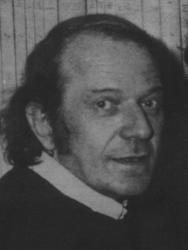

|
|
![]()
Current Continental Philosophy examines the ideas of influential European philosophers in the second half of the 20th Century. Movements studied include Neo-Marxist critical theory, philosophical hermeneutics, structuralist psychoanalysis, French feminism, deconstruction, poststructuralism, and postmodernism.
Texts:
| Class date | Topic | Reading assignment |
| Aug. 31 | Introduction | |
| Sept. 2 | What is Continental Philosophy? | CS 3-17 |
| Sept. 7 | Marx, Freud, Nietzsche | CS 118-26, 153-60, 162-72 |
| Sept. 9 | Lukacs | CS 455-60; MF 229-38 |
| Sept. 14 | Horkheimer | CS 362-69; MF 253-59 |
| Sept. 16 | Adorno | CS 370-80; & selections from Negative Dialectics |
| Sept. 21 | Gadamer | CS 433-41; MF 186-93 |
| Sept. 23 | Habermas | CS 397-405; MF 186-93 |
| Sept. 28 | Habermas and Third Generation Critical Theorists | "Discourse Ethics" & CS 407-12 |
| Sept. 30 | Althusser | CS 530-35; MF 271-78 |
| Oct. 5 | Althusser | "Materialist Dialectic" |
| Oct. 7 | Test 1 | |
| Oct. 12 | Saussure | MF 297-304 |
| Oct. 14 | Lacan | CS 519-28; MF 329-38 |
| Oct. 19 | Deleuze | CS 559-72 |
| Oct. 21 | Deleuze | MF 365-73 & Nietzsche and Philosophy |
| Oct. 26 | Cixous & LeDoeuff | CS 607-12; MF 374-79 |
| Oct. 28 | Irigaray & Kofman | CS 588-97; MF 416-27 |
| Nov. 2 | Kristeva | CS 599-604; MF 406-15 |
| Nov. 4 | Test 2 | |
| Nov. 9 | Levinas | CS 245-54; MF 176-85 |
| Nov. 11 | Derrida | CS 549-57; MF 354-64 |
| Nov. 16 | Derrida | "Deconstruction and the Other" |
| Nov. 18 | Foucault | CS 537-46; MF 380-89 |
| Nov. 23 | Foucault | "Discourse on Language" |
| (Nov. 25) | (Thanksgiving) | |
| Nov. 30 | Lyotard | CS 574-79; MF 391-404 |
| Dec. 2 | Baudrillard | CS 581-87; MF 441-46 |
| Dec. 7 | Afterword | CS 613-38 |
| Dec. 15 (Wednesday) | Final exam due 10 a.m. |
Office (Bolton 302 B) hours: Tuesday 2:30-5:00; Thursday 2:30-3:30
Phone: 845-5619 (office), 846-4649 (home)
Email: sdaniel@unix.tamu.edu
Web site: people.tamu.edu/~sdaniel/419sy99c.html
Grades/Tests: Grades are based on two essay tests (worth 25% each), the final take-home exam (worth 30%), and two short (two typed-page) reading summaries (10% each). Both reading summaries must be turned in by Oct. 14. Extra credit for additional reading summaries is also available (see below). If you miss a test, contact me before the next class meeting to take a make-up. Class attendance can significantly affect your performance on tests and summaries, but there is no specific grade for attendance as such.
About the Reading Summaries
Out of the 26 class days for which there are readings assigned, you have to select at least two on which to write brief (two typed-page) summaries of the material covered that day. Summaries are to be submitted at the beginning of the class the day we discuss the material; after that class, you should work on another reading. The decision about which readings to write on is up to you, but at least two summaries must be submitted by Oct. 14. You may submit more than two summaries if you want to improve your final grade or perhaps even be exempted from the final exam.
Here is how to be exempted from the final exam. Everyone must take the two in-class tests (which count for 50% of the final grade). The remaining 50% is determined by the final exam plus your two highest grades for reading summaries and points from extra reading summaries. For additional summaries, you receive extra grade points: 3 points for an A, 2 for a B, and 1 for a C (+ or - grades do not make a difference except for calculating the two required summaries). If you get A's on nine summaries beyond the two that form the base, you pick up an additional 27 points.
Let's say you make a 90 on both tests (50% of your final grade=45 points). And let's say that your two highest grade summaries are A-'s. (A- is a 92, A is a 95, A+ is a 98; the same 2-5-8 scheme applies to the other letter grades as well.) Since each base summary is worth 10% of the final grade, the two summaries (9.2 points each) total 18.4 points, which added to the 45 from the tests=63.8 points. If you do nine more summaries and get A-'s on all of them, you get 27 more points, which when added to the 63.8 points gives you 90.8 points, enough for an A in the course without having to take the final.
Even if you don't collect enough points to exempt the final, you can improve your possibilities for getting an A in the course by doing more than two summaries. Suppose you get an 80 on both tests (=40 points), turn in two B summaries (8.5 x 2=17 points) and get an 83 on the final exam (=24.9 points). Those four B grades would get you a B (81.9) for the course. But if you had turned in only four additional B summaries (8 points), you would have 89.9 (which rounds to an A) for the course without ever getting a grade higher than a B for any assignment. It is important to turn in summaries as often as possible to improve your grade and understand the material better.
Guidelines for the Summaries
Summaries should address the question: What are the main points and arguments (not biographic or historical topics) discussed in the assigned readings? Each summary must refer to at least two secondary sources other than the readings themselves, explaining the issues raised. You have to find books in the library that talk about our author's treatment of the topics raised in the reading and indicate how these secondary sources clarify particular points. Include full bibliographic reference to the sources you cite. Begin with more general studies such as the following:
You only have two pages to summarize the points of the essay(s) we are studying that day, so use your words economically. Likewise, use paper wisely: don't turn in a page with one or two lines at the top; squeeze them in on the previous pages by changing the margins to accommodate them.
Summaries should be limited solely to the points raised in the readings. They are not intended as opportunities for you to say how you agree or disagree with the author. Avoid statements like "For centuries philosophers ..." Finally, make sure you cover all assigned pages, especially if the assignment covers more than one reading (as it does most days).
![]()
![]()
 Send Dr. Daniel a message: sdaniel@unix.tamu.edu
Send Dr. Daniel a message: sdaniel@unix.tamu.edu